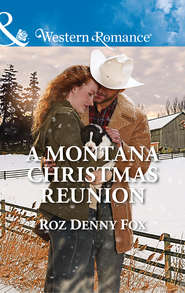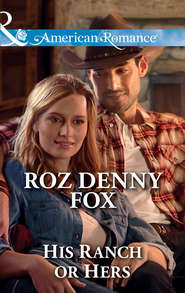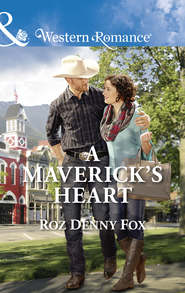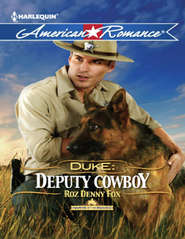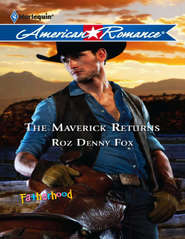По всем вопросам обращайтесь на: info@litportal.ru
(©) 2003-2024.
✖
Daddy's Little Matchmaker
Автор
Год написания книги
2019
Настройки чтения
Размер шрифта
Высота строк
Поля
Maybe that was wishful thinking. Gripping the neck of the vase, Alan scanned the hill behind the cottage. Between the upper and lower dwellings, two horses poked their heads over a split rail corral.
Alan had assumed, maybe wrongly, that someone was home, based on the battered pickup beside which he’d parked his Jeep. It occurred to him now that she could be out riding. Although… He glared suspiciously at the window again. Was it logical to leave her monster dog to watch the house instead of taking him along for protection? Hell, maybe her bite was worse than her dog’s.
He knew absolutely nothing about Laurel Ashline, except that she had a sexy voice. He probably should’ve gleaned more details from his grandmother. Or from Eva Saxon, who loved sharing gossip more than anything else on earth.
He felt like a fool standing here, clutching a vase of pink rosebuds, squared off with a snarling dog. Yet it was obvious the German shepherd wasn’t going to let him cross.
Hitting on a new plan, Alan dug out his cell phone and punched in the number written on the crumpled business card. She might be working in the upper cottage. He had no idea whether looms made more noise than that fool dog. He frankly doubted it, but then he knew nothing about weaving.
The phone rang and rang. If he took the cell away from his ear, he could hear it ring in the cottage across the way. Listening through at least twenty rings, he finally swore again, closed the phone, and stowed it away. That was when he noticed the garbage can sitting near his Jeep. Damned if sticking out of it wasn’t a still-wrapped basket of fruit.
“Phew! Stinko!” Striding up to the container, Alan waved away a swarm of flies and saw that the fruit had rotted. He would bet ten to one that Ms. Ashline had read the card Vestal had composed in his name and then tossed the whole thing in the trash. Hell, the proof was staring at him. She had tossed away a kind gesture, lock, stock and basket. The card lay on top of the torn cellophane.
Alan moved away from the odor and the flies, wondering what kind of person could do that—throw away an apology, judging a man she didn’t know. Unless she just hated men, period.
That notion raised his hackles. It made him want to lob the damn vase at her front window. But, no, that’d probably be the type of macho jerk action she’d expect him to pull.
Instead, baring his own teeth at the dog, Alan stalked across the bridge and roared, “Hush up!” The animal backed off with a surprised whimper, just long enough to give Alan a chance to set the vase on the porch. “Pitch those in the trash,” he yelled at her tightly closed door. “You can’t hide forever. We have unfinished business, you and I. One day we’ll meet. Bank on it!”
Because the shepherd had recovered from the onslaught, and now raced at him again, barking furiously, Alan lost no time hotfooting it back to his Jeep. Though he was sweating like a pig and panting like a man twice his age, he felt a measure of satisfaction at accomplishing his mission.
And oddly, he hadn’t felt so alive in months. Not—he realized with shock—since the accident. As he started the Jeep and made a sweeping turn, aiming the vehicle downhill to the highway, he thought about the hermit he’d become in recent months. And he didn’t like the picture. Didn’t like it at all.
FLATTENED AGAINST THE WALL between the window and the door, Laurel waited several long minutes following her visitor’s last diatribe. She wished she’d had a clearer look at him. Framed against the trees, with the backdrop of brilliant sunlight, he’d been little more than a shadow.
She’d apparently out-waited him at last. Dog had stopped his incessant barking. Venturing another glance through a gap in the curtain, she saw that the pesky man had indeed gone.
Laurel opened the door just a little, and Dog trotted up, shaking his shaggy coat. “Good boy,” she said, praising his efforts as she stepped out and rubbed his ears. He seemed to grin at her, slobbering on her jeans when he rose on hind legs to lick her face. Dropping again, the dog lowered his head to sniff at something behind the screen. A low growl alerted Laurel and she went to investigate.
A cut-glass vase holding several rosebuds of a delicate pink winked at her in the flickering light. Laurel’s breath caught in her throat. He’d left her flowers? Roses. Store-bought roses.
Kneeling, she fingered the soft, fragrant petals. She had to shove Dog’s nose aside as she hesitantly picked up the vase. Breathing in the light, sweet scent, she smiled through suddenly teary eyes. This must be what he’d shouted at her to pitch. She thought he’d retrieved his earlier offering of fruit from the garbage can. Why on earth would the man brave being bitten by Dog to leave flowers for an ungrateful wretch who’d disposed of his first gift? Fruit baskets weren’t cheap. Nor were roses in cut-glass vases. Too bad they’d been purchased with the profits from whiskey, she thought with a sigh.
She nudged open the screen door, letting Dog lead the way inside. Despite everything, she couldn’t help being touched. Laurel tried the vase in three separate locations before finally carrying it up the hill to her loom cottage. Shabbily though she’d treated him, Laurel reasoned it didn’t mean she shouldn’t enjoy the first bouquet anyone had ever given her. Well, technically she supposed, three rosebuds, some fronds of fern and a stalk of baby’s breath wasn’t a bona fide bouquet. Nevertheless, they were lovely.
Gazing at them, she felt more…more…well, more for the giver than she’d wanted to. Guilt cloaked her as she took a seat at one of her floor looms, which she’d set up for weaving a commissioned rose-patterned bedspread.
Alan Ridge’s roses sat on the windowsill, reminding her how abominably she’d acted.
Whether he was aware of it or not, Mr. Ridge had made a favorable impression, and she should probably revise her earlier opinion. She was sorry she hadn’t gone out to see him. Maybe she should call him—just to say thank-you.
Humming a tuneless melody, Laurel kept time alternately with the foot pedals and the beater bar of her giant loom. The double-rose pattern her client had selected for this piece dated back to the late seventeen hundreds. An elderly weaver who’d given Laurel the pattern had painstakingly written directions with a stubby pencil on tablet paper. The old weaver called the entwined roses “Bachelor Among the Girls.” Did that describe Alan Ridge? Laurel supposed not. Eva Saxon from the flower shop had said Ridge’s wife had died in an auto accident. That made him a widower.
So Laurel could call this version of the pattern “Widower among the Ladies.” Given his stature in the community, if he handed out roses willy-nilly, Alan Ridge had to be a hit with every unattached female for miles around.
A hit with everyone except her. The kindness of his gesture aside, Laurel still disliked the man’s business. Did he know or care how many potentially good people had problems with whiskey? How many lives had been destroyed by liquor? On second thought, she wouldn’t be phoning the whiskey baron of Ridge City to say thank-you anytime soon. Laurel had made one monstrous mistake when it came to letting a man’s charm sway her. She’d do well to remember that flowers faded, and so did romance.
But he didn’t have to bring you flowers, insisted a nagging voice inside her head—a voice she was determined to ignore.
ALAN STOPPED IN TOWN for the second time that day on the pretext of picking up a few groceries for Birdie and checking on a grain order for Windridge. His visit didn’t go unnoticed, since he so rarely got to town these days. So when he asked questions about Laurel Ashline he couldn’t really blame the shopkeepers who were reluctant to give much away.
At the granary he was told Eva Saxon had described Laurel as a tall, willowy blonde. Peg Moore, waitress at the corner café eyed Alan as she wiped off the counter and poured his coffee. “Laurel Ashline is…rather plain, I’d say. And she’s either really shy or exceptionally quiet.”
“About how old, would you guess?” Alan asked casually.
“Um, late twenties or early thirties,” Peg ventured.
That surprised him, and pretty much ruled out the possibility that she’d been one of the women who’d attended Hazel Bell’s funeral. They’d all been matronly.
He could see that everyone in the café was curious. But, typical of folks in this part of Kentucky, no one pressed Alan to say why he wanted to learn more about the stranger in their midst.
“It’s later than I thought. I should be getting home. Louemma will be finishing her lessons, and I have a message for her tutor from the school.” Depositing a tip next to his coffee cup, Alan stood up.
“Is Louemma improving at all?” Peg asked what few ever did of Alan.
“Not really,” he admitted reluctantly.
“I thought that was probably the case. Yesterday Charity Madison brought her Camp Fire troop in for ice cream. Used to be you never saw Sarah Madison without Louemma. Peg shook her head. “That Sarah’s getting a mouth on her, and Charity doesn’t seem to know how to curb it. If it was me, I’d be giving that little miss some chores, and I’d take away privileges.”
Alan didn’t respond. Charity and Pete Madison had been his and Emily’s best friends. To their credit, the couple had tried to include him and Louemma in their social events after the accident. But there was no denying the dynamics were different now. Maybe Charity couldn’t bring herself to discipline Sarah, he mused. Because Louemma’s experience showed how quickly life could change for the worse. Could be Charity was plain glad Sarah hadn’t been with Louemma at the time Emily’s car spun out of control.
At home again, Alan carried the groceries he’d bought in the back door. He’d missed Louemma’s tutor, so he’d have to call her later. He sat down beside his daughter on the couch in front of the TV and kissed the top of her head.
“Hi, Daddy. Where’ve you been?”
“Nowhere. I just ran some errands in town.”
Birdie bustled into the room bearing a plate of oatmeal-raisin cookies and a tall glass of milk. Vestal appeared out of nowhere, clearly wanting to nab Alan.
As Birdie sat down to help Louemma drink and eat, Vestal yanked him out of the living room, into the hall. “What happened when you went to see Laurel Ashline? When’s she coming to see Louemma?”
He scowled. “Who said I even went to see Ms. Ashline?”
“Eva. She phoned right after you left her shop. Trying her best to learn why you followed up a basket of fruit with a vaseful of roses for a woman who apparently told Eva she hadn’t even met you. You know Eva can’t stand to think that anyone in town is keeping secrets from her.”
“Three roses, Grandmother, not a vaseful.” Alan wiggled three fingers. “She wasn’t home, by the way. And speaking of secrets, why didn’t you tell me you sent her that fruit basket in my name?”
Vestal did have the grace to look guilty.
“Also, were you aware she’s living in Hazel Bell’s cottage? Her cottage, on our land. It is, you know. Ours.” He narrowed his eyes and watched his grandmother clasp a fist to her thin chest.
“That’s why her name sounded familiar. Ashline—that was the transient workman Lucy Bell ran off with. Oh, my. Laurel must be Lucy’s daughter.”
“What? Ted never mentioned having a granddaughter.”
“No. But it has to be. In that case, you have your answer as to why she settled here. Laurel Ashline has roots in Ridge City.”
“No way! Her mother ran off how many years ago?”






